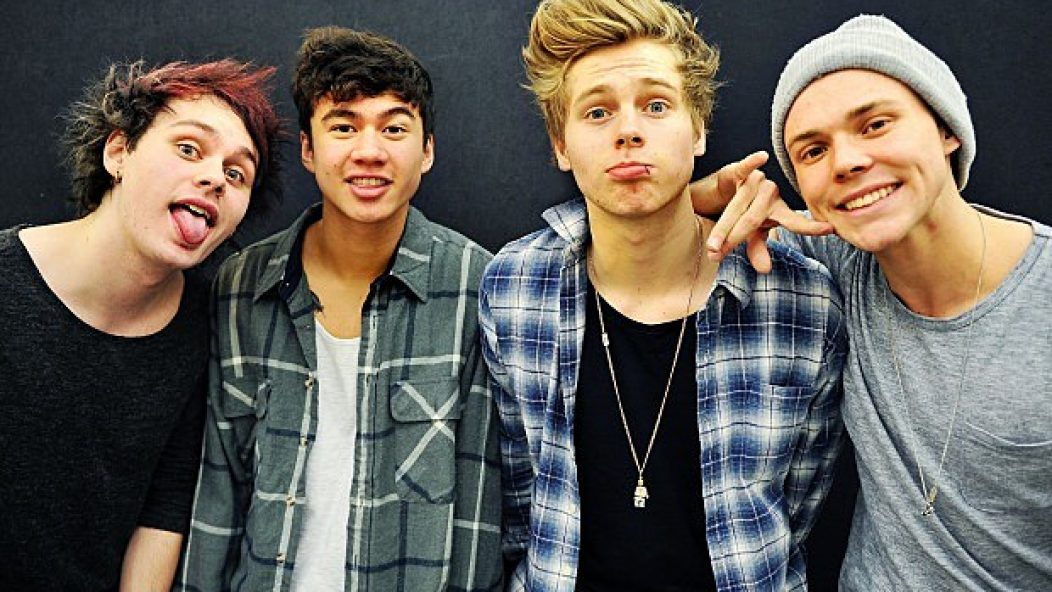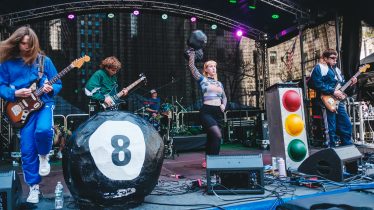
Why 5 Seconds Of Summer are more important to pop-punk than you think
It’s time to address the elephant in the room: 5 Seconds Of Summer are blowing up. Their hit single, “She Looks So Perfect,” is taking over the radio and their EP of the same name debuted at No. 2 on the Billboard 200 chart, selling 143,000 copies in its first week. Why does this matter to us? Well, for one thing, the band are being branded as pop-punk, which they are, albeit the poppiest, most radio-friendly form. In a broader view, what this means is that the massive major-label infrastructure pushing this band is highlighting the fact that they’re pop-punk—not trying to change them into a boy band—at a time when pop-punk couldn’t be more maligned as a genre by mainstream music culture. Think about it. When’s the last you heard a pop-punk band (that wasn’t Fall Out Boy) have mainstream radio success? It’s been a while.
This is great! Major labels are ready to push pop-punk again? Push on. The last time last time we saw an explosion of the genre with the full backing of the music industry, we got Blink-182, Sum 41, Good Charlotte, New Found Glory and more. Those bands sold millions of records. Those bands pushed the genre decades forward and inspired a massive subsequent wave of bands who now shape today’s music.
You don’t have to like them. You don’t even have to listen to them. Just be open to the opportunity this Australian quartet represent for the genre and the pop-punk bands you do love. Before signing to Capitol Records, the group got their start by posting cover songs on YouTube by bands like A Day To Remember, Mayday Parade, All Time Low and Blink-182—most of whom they cite as their influences. The band really began to take off after they got the public nod of approval—and a supporting tour role—from One Direction, who they share managers with. It’s entirely likely that most of their current fans are One Direction fans: young, obsessive tweens with boatloads of their parents’ cash to throw around.
And where’s the trail of influence going to lead those fans? When these obsessive fans learn (and they will learn) that their favorite band got their start by covering pop-punk bands and cite them as influences, are they going to come looking? Are they going to start listening to Mayday Parade? Absolutely. Will that lead them to the Summer Set? All Time Low? Maybe even the Wonder Years? Probably. I know what you’re thinking: “The last thing I want is a bunch of screaming 1D fans in my scene.” Why not? Let the mainstream audience in. Open the floodgates. The bands, the labels and the diehard fans would almost certainly welcome them. We have plenty of records to sell. Plenty of careers to nurture. Plenty of bands who need help getting out of their hometowns. Please, do come.
Here in the underground, our scene is practically boiling over with new, young pop-punk bands full of talent. A mainstream acceptance of the genre would be a welcome opening of a musical pressure valve. Let’s send some of these bands up. The days of them all cannibalizing the same indie scene for fans may be coming to a close. That’s not to speak less of the older pop-punk bands who have been around for a while, grinding it out. Their careers could still take off, too. Nate Ruess from the Format taught us that after peaking later in his musical career with the explosion of fun. Sometimes, all it takes is a spark. Ruess’ spark was “We Are Young.” For pop-punk, 5SOS could be that spark—a cultural kindling, if you will. Who knows, maybe even We The Kings have another “Check Yes Juliet” in them.
It’s a rarity to even hear guitars on pop radio nowadays. Pop music is going through what seems to be a second disco era. The music is shallow, electronic and more so based on the idea of going out and partying than any sort of artistic digestion. Music culture tends to react. Grunge came as a reaction to the excess of hair metal. Disco came as a reaction to the dark era of the Vietnam War. Mainstream America may just be getting to the point now where they’re fed up with the shallow void of today’s pop music. They’re ready to hear guitars again. They’re ready to react and crave something new. Our poppy Australian hopefuls may be the spearhead of the sonic assault that leads pop-punk to the mainstream throne.
Looking inward, if pop-punk did break into the mainstream once more, it’s not entirely clear how our scene would react specifically. Would the genre still be considered cool? Or would it be rejected, with kids moving on to something more underground? More than most genres, pop-punk has a certain longevity with its legitimacy: It’s able to endure massive exposure and short term hype without losing its credibility to core fans. Some fans were angry over New Found Glory signing with a major label and making more radio-friendly tunes in the early 2000s. But nearly 15 years later, the band have endured and can still sell out shows.
If 5SOS prove to be a success (and it’s looking like they are), it’s only a matter of time before the powers that be come looking for the next acts that fit the brand and can be taken to stardom. More money, recourses and exposure for pop-punk bands from our scene could very well be a direct result. If pop-punk becomes the thing again, our scene becomes the goldmine. One more wave of success for pop-punk? Sounds great. A musical gold rush for our scene? Bring it on. Ride that wave. You don’t have to like 5 Seconds Of Summer, and you don’t have to listen to them (even though the song is kind of catchy, with a chorus that could’ve easily been written by a young Patrick Stump). But let’s be prepared to take full advantage of their success.








